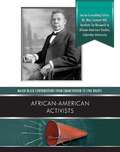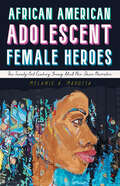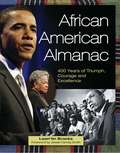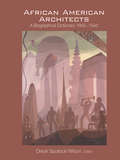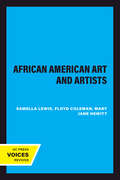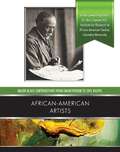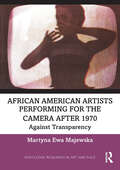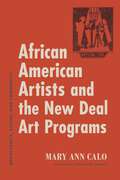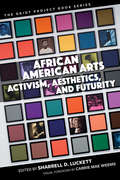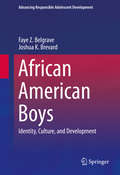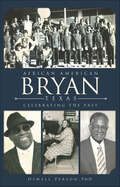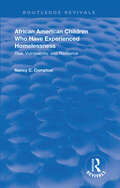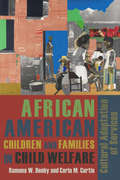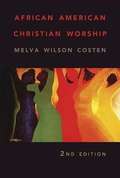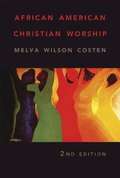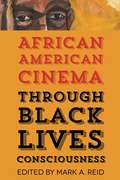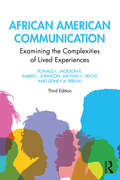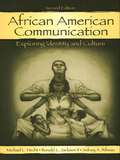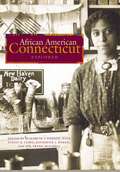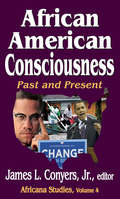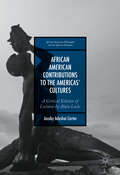- Table View
- List View
African Air Transport Management: Strategic Analysis of African Aviation Market (Advances in African Economic, Social and Political Development)
by Eyden SamunderuThis book provides a comprehensive overview of the African air transport market from a strategic management perspective. Drawing on well-grounded theories, research applications and real-world case studies, it examines competition dynamics, interconnectivity, the growth of low-cost carriers, and demand patterns in air transport for both passenger and cargo traffic. It also presents an expert analysis on the introduction of the Single African Air Transport Market (SAATM), made possible by the liberalization of the air transport market, from a regulatory perspective. Based on the results of the analysis, the book evaluates both the benefits and limitations of an open skies agreement. Furthermore, it shed lights on the challenges and complexities of African public infrastructure investments and airport financing, discusses the impact of COVID-19, and provides strategic recommendations for airlines. The book is aimed at professionals in aviation and airline industries and students interested in the African air transport market.
African American Activists (Major Black Contributions from Emancipat)
by Carol EllisThe Civil War finally ended slavery in the United States in 1865. But blacks didn't suddenly enjoy all the rights other Americans took for granted. They had to struggle against racism and discrimination to claim those rights. African-American Activists traces that generations-long struggle. In this book, you'll meet early activists like Booker T. Washington and W. E. B. Du Bois, who had very different ideas about how blacks should take their place in American society. You'll read about activists who worked for integration and equality under the law during the civil rights movement, including Rosa Parks and John Lewis. And you'll learn how a new generation of African-American activists, such as Majora Carter and Van Jones, continue to work for a better society today.
African American Adolescent Female Heroes: The Twenty-First-Century Young Adult Neo-Slave Narrative (Children's Literature Association Series)
by Melanie A. MarottaIn the wake of the second wave of the Black Lives Matter movement, inequalities and disparities were brought to light across the publishing industry. The need for more diverse, representative young adult literature gained new traction, resulting in an influx of young adult speculative fiction featuring African American young women. While the #BlackGirlMagic movement inspired a wave of positive African American female heroes in young adult fiction, it is still important to acknowledge the history and legacy of enslavement in America and their impact on literature. Many of the depictions of young Black women in contemporary speculative fiction still rely on stereotypical representations rooted in American enslavement.African American Adolescent Female Heroes: The Twenty-First-Century Young Adult Neo-Slave Narrative investigates the application of the neo-slave narrative structure to the twenty-first-century young adult text. Author Melanie A. Marotta examines texts featuring a female, adolescent protagonist of color, including Orleans, Tankborn, The Book of Phoenix, Binti, and The Black God’s Drums, as well as series like the Devil’s Wake series, Octavia E. Butler’s Parable series, and the Dread Nation series. Taken together, these chapters seek to analyze whether the roles for adolescent female characters of color are changing or whether they remain re-creations of traditional slave narrative roles. Further, the chapters explore if trauma, healing, and activism are enacted in this genre.
African American Almanac
by Jessie Carney Smith Lean'Tin BracksThe most complete and affordable singlevolume reference of African American culture available today, this almanac is a unique and valuable resource devoted to illustrating and demystifying the moving, difficult, and often lost history of black life in America. A legacy of pride, struggle, and triumph spanning more than 400 years is presented through a fascinating mix of biographies-including more than 750 influential figures-littleknown or misunderstood historical facts, enlightening essays on significant legislation and movements, and 150 rare photographs and illustrations. Covering events surrounding the civil rights movement; African American literature, art, and music; religion within the black community; and advances in science and medicine, this reference connects history to the issues currently facing the African American community and provides a range of information on society and culture.
African American Architects: A Biographical Dictionary, 1865-1945
by Dreck Spurlock WilsonAfrican-American architects have been designing and building houses and public buildings since 1865. Although many of these structures survive today, the architects themselves are virtually unknown. This unique reference work brings their lives and work to light for the first time. Written by 100 experts ranging from architectural historians to archivists, this book contains 160 biographical, A-Z entries on African-American architects from the era of Emancipation to the end of World War II. Articles provide biographical facts about each architect, and commentary on his or her work. Practical and accessible, this reference is complemented by over 200 photographs and includes an appendix containing a list of buildings by geographic location and by architect.
African American Art and Artists
by Samella LewisSamella Lewis has brought African American Art and Artists fully up to date in this revised and expanded edition. The book now looks at the works and lives of artists from the eighteenth century to the present, including new work in traditional media as well as in installation art, mixed media, and digital/computer art. Mary Jane Hewitt, an author, curator, and longtime friend of Samella Lewis's, has written an introduction to the new edition. Generously and handsomely illustrated, the book continues to reveal the rich legacy of work by African American artists, whose art is now included in the permanent collections of national and international museums as well as in major private collections.
African American Artists (Major Black Contributions from Emancipat)
by Carol EllisFrom quilts to marble, from comic strips to welded steel, African Americans have created exciting works of art for more than a hundred years. African-American Artists traces the struggles and shows the work of many of these men and women. This book will introduce you to Harriet Powers, who was born a slave and who told legends and stories on her quilts. You'll meet Horace Pippin, who taught himself to paint and kept painting even after he lost the use of his arm. Cartoonist Aaron McGruder and digital artist Angela Perkins are among the African-American artists who continue to enrich the nation's culture today.
African American Artists Performing for the Camera After 1970: Against Transparency (Routledge Research in Art and Race)
by Martyna Ewa MajewskaThis study demonstrates how African American artists active since the 1970s have instrumentalized performance for the camera to intervene in existing representations of Black and Brown people in America and beyond.Majewska argues that producing carefully designed photographs, films, and videos via performance became a key strategy for dismantling the conceptions of race and gender fixed by US popular culture, jurisprudence, and pseudoscience. Studying the work of Adrian Piper, Glenn Ligon, Lyle Ashton Harris, Senga Nengudi, Maren Hassinger, Howardena Pindell, David Hammons, and Pope.L, this book examines the ways in which these artists incorporate their bodies and personal experience into their respective performances, simultaneously courting and foreclosing autobiographical readings. The strategies examined here, while diverse, all challenge conventional interpretations of performance art—especially those overdetermined by race, gender, and sexuality.The book will be of interest to scholars working in art history, performance studies, photography, and African American studies.
African American Artists and the New Deal Art Programs: Opportunity, Access, and Community
by Mary Ann CaloThis book examines the involvement of African American artists in the New Deal art programs of the 1930s. Emphasizing broader issues informed by the uniqueness of Black experience rather than individual artists’ works, Mary Ann Calo makes the case that the revolutionary vision of these federal art projects is best understood in the context of access to opportunity, mediated by the reality of racial segregation.Focusing primarily on the Federal Art Project (FAP) of the Works Progress Administration (WPA), Calo documents African American artists’ participation in community art centers in Harlem, in St. Louis, and throughout the South. She examines the internal workings of the Harlem Artists’ Guild, the Guild’s activities during the 1930s, and its alliances with other groups, such as the Artists’ Union and the National Negro Congress. Calo also explores African American artists’ representation in the exhibitions sponsored by WPA administrators and the critical reception of their work. In doing so, she elucidates the evolving meanings of the terms race, culture, and community in the interwar era. The book concludes with an essay by Jacqueline Francis on Black artists in the early 1940s, after the end of the FAP program.Presenting essential new archival information and important insights into the experiences of Black New Deal artists, this study expands the factual record and positions the cumulative evidence within the landscape of critical race studies. It will be welcomed by art historians and American studies scholars specializing in early twentieth-century race relations.
African American Arts: Activism, Aesthetics, and Futurity (The Griot Project Book Series)
by Sharrell D. Luckett Carmen Gillespie Rikki Byrd Amber Lauren Johnson Doria E. Charlson Florencia V. Cornet Daniel McNeil Lucy Caplan Genevieve Hyacinthe Sammantha McCalla Nettrice R. Gaskins Abby Dobson J. Michael Kinsey Shondrika Moss-Bouldin Julie B. Johnson Jasmine Eileen Coles Tawnya Pettiford-Wates Rickerby HindsSignaling such recent activist and aesthetic concepts in the work of Kara Walker, Childish Gambino, BLM, Janelle Monáe, and Kendrick Lamar, and marking the exit of the Obama Administration and the opening of the National Museum of African American History and Culture, this anthology explores the role of African American arts in shaping the future, and further informing new directions we might take in honoring and protecting the success of African Americans in the U.S. The essays in African American Arts: Activism, Aesthetics, and Futurity engage readers in critical conversations by activists, scholars, and artists reflecting on national and transnational legacies of African American activism as an element of artistic practice, particularly as they concern artistic expression and race relations, and the intersections of creative processes with economic, sociological, and psychological inequalities. Scholars from the fields of communication, theater, queer studies, media studies, performance studies, dance, visual arts, and fashion design, to name a few, collectively ask: What are the connections between African American arts, the work of social justice, and creative processes? If we conceive the arts as critical to the legacy of Black activism in the United States, how can we use that construct to inform our understanding of the complicated intersections of African American activism and aesthetics? How might we as scholars and creative thinkers further employ the arts to envision and shape a verdant society? Contributors: Carrie Mae Weems, Carmen Gillespie, Rikki Byrd, Amber Lauren Johnson, Doria E. Charlson, Florencia V. Cornet, Daniel McNeil, Lucy Caplan, Genevieve Hyacinthe, Sammantha McCalla, Nettrice R. Gaskins, Abby Dobson, J. Michael Kinsey, Shondrika Moss-Bouldin, Julie B. Johnson, Sharrell D. Luckett, Jasmine Eileen Coles, Tawnya Pettiford-Wates, Rickerby Hinds. Published by Bucknell University Press. Distributed worldwide by Rutgers University Press.
African American Boys: Identity, Culture, and Development (Advancing Responsible Adolescent Development)
by Faye Z. Belgrave Joshua K. BrevardThis book discusses current research on identity formation, family and peer influences, risk and resilience factors, and concepts of masculinity and sexuality in African American boys. Sorting out genuine findings from popular misconceptions and misleading headlines, this concise and wide-ranging reference covers the crucial adolescent years, ages 11-16, acknowledging diversity of background and experience in the group, and differences and similarities with African American girls as well as with other boys. In addition, the authors review strengths-based school and community programs that harness evidence and insights to promote pro-social behavior. Featured areas of coverage include: The protective role of ethnic identity and racial socialization. Family management, cohesion, communication, and well-being. Development and importance of peer relationships. Health and well-being. Theoretical perspectives on educational achievement. Factors that contribute to delinquency and victimization. What works: effective programs and practices. African American Boys is an essential resource for a wide range of clinicians and practitioners - as well as researchers and graduate students - in school and clinical child psychology, prevention and public health, social work, mental health therapy and counseling, family therapy, and criminal justice.
African American Bryan, Texas: Celebrating the Past (American Heritage)
by Oswell Person PhDBryan was incorporated in 1872, but it would take more than ten years before its African American population was offered schooling. Nothing would come easy for them, but they persevered through hard work, ingenuity and family support. The success of today's generation is a direct result of determined, hardworking pioneers like Dr. Samuel J. Sealey Sr., Bryan's "baby doctor" in the 1930s and '40s, and Dr. William A. Hammond Sr., who opened Bryan's first black hospital and employed many blacks through his business ventures. Learn about the inspiration and guidance provided by the likes of Oliver Wayne Sadberry, an outstanding community leader and principal of Fairview and Washington Elementary. Dr. Oswell Person shares the story of this community's achievements, successes and contributions in the face of incredible odds.
African American Childhoods: Historical Perspectives from Slavery to Civil Rights
by Wilma KingThis text seeks to fill a vacuum in the study of African American children. Recovering the voices or experiences of these children, we observe nuances in their lives based on their legal status, class standing, and social development.
African American Children Who Have Experienced Homelessness: Risk, Vulnerability, and Resilience
by Nancy C. ComptonFirst published in 1998. While there are ever-increasing numbers of families with young children becoming homeless, little is known about interventions which can promote homeless childrens’ resiliency. This study identifies factors that contribute to homeless children’s positive outcomes. Seventeen African-American children and their mothers were identified through an agency that serves high-risk homeless families. The children were between the ages of three and six-and-a-half.
African American Children and Families in Child Welfare
by Ramona Denby Carla M. CurtisThis text proposes corrective action to improve the institutional care of African American children and their families, calling attention to the specific needs of this population and the historical, social, and political factors that have shaped its experience within the child welfare system. The authors critique policy and research and suggest culturally targeted program and policy responses for more positive outcomes.
African American Children and Families in Child Welfare: Cultural Adaptation of Services
by Ramona Denby Carla CurtisThis text proposes corrective action to improve the institutional care of African American children and their families, calling attention to the specific needs of this population and the historical, social, and political factors that have shaped its experience within the child welfare system. The authors critique policy and research and suggest culturally targeted program and policy responses for more positive outcomes.
African American Christian Worship (Revised Edition)
by Melva Wilson CostenThis book is a lively history and theology of the African American worship experience. The author details the global impact on African American worship by media, technology, and new musical styles. She expands her discussion of ritual practices in African communities and clarifies some of the ritual use of music in worship.
African American Christian Worship: 2nd Edition
by Melva W. CostenIn this update to her 1993 classic, African American Christian Worship, Melva Wilson Costen, again delights her reader with a lively history and theology of the African American worship experience. Drawing upon careful scholarship and engaging stories, Dr. Costen details the global impact on African American worship by media, technology, and new musical styles. She expands her discussion of ritual practices in African communities and clarifies some of the ritual use of music in worship. In keeping with recent congregational practices, Dr. Costen will also provide general orders of worship suitable for a variety of denominational settings.
African American Cinema through Black Lives Consciousness
by Mark A. Reid Gerald R. Butters Jr. Karen Bowdre African American Cinema Dan Flory African American Cinema Mark D Cunningham African American Cinema Patricia Hilliard-Nunn African American Cinema Kimberly Nichele Brown African American Cinema Chesya Burke African American Cinema Anne Cremieux African American Cinema James Smalls Charlene Regester Dr Jonathan Munby Dr Melba Joyce BoydAfrican American Cinema through Black Lives Consciousness uses critical race theory to discuss American films that embrace contemporary issues of race, sexuality, class, and gender. Its linear history chronicles black-oriented narrative film from post–World War II through the presidential administration of Barack Obama. Editor Mark A. Reid has assembled a stellar list of contributors who approach their film analyses as an intersectional practice that combines queer theory, feminism/womanism, and class analytical strategies alongside conventional film history and theory. Taken together, the essays invigorate a "Black Lives Consciousness," which speaks to the value of black bodies that might be traumatized and those bodies that are coming into being-ness through intersectional theoretical analysis and everyday activism. The volume includes essays such as Gerald R. Butters’s, "Blaxploitation Film," which charts the genre and its uses of violence, sex, and misogyny to provoke a realization of other philosophical and sociopolitical themes that concern intersectional praxis. Dan Flory’s "African-American Film Noir" explains the intertextual—fictional and socio-ecological—dynamics of black action films. Melba J. Boyd’s essay, "‘Who’s that Nigga on that Nag?’: Django Unchained and the Return of the Blaxploitation Hero," argues that the film provides cultural and historical insight, "signifies" on blackface stereotypes, and chastises Hollywood cinema’s misrepresentation of slavery. African American Cinema through Black Lives Consciousness embraces varied social experiences within a cinematic Black Lives Consciousness intersectionality. The interdisciplinary quality of the anthology makes it approachable to students and scholars of fields ranging from film to culture to African American studies alike.
African American Communication: Examining the Complexities of Lived Experiences (Routledge Communication Series #Vol. 2)
by Michael L. Hecht Sidney A. Ribeau Ronald L. Jackson II Amber L. JohnsonNow in its third edition, this text examines how African Americans personally and culturally define themselves and how that definition informs their communication habits, practices, and norms. This edition includes new chapters that highlight discussions of gender and sexuality, intersectional differences, contemporary social movements, and digital and mediated communication. The book is ideally suited for advanced students and scholars in intercultural communication, interpersonal communication, communication theory, African American/Black studies, gender studies, and family studies.
African American Communication: Exploring Identity and Culture
by Michael L. Hecht Ronald L. Jackson Sidney A. RibeauWhat communicative experiences are particular to African Americans? How do many African Americans define themselves culturally? How do they perceive intracultural and intercultural communication? These questions are answered in this second edition of African American Communication: Exploring Identity and Culture. Informing multiple audiences interested in African American culture, from cultural researchers and practitioners to educators, policymakers, and community leaders, this innovative and invaluable resource examines the richness and depth of African American communication norms and patterns, as well as African American identities. Positive and healthy African American identities are centrally positioned throughout the book. Applying the cultural contracts theory and the communication theory of identity, authors Michael L. Hecht, Ronald L. Jackson II, and Sidney A. Ribeau explore relationships among African Americans, as well as between African Americans and European Americans, while highlighting the need for sensitivity to issues of power when discussing race, ethnicity, and culture. This wide-ranging volume provides an extensive review of the relevant literature and offers recommendations designed to encourage understanding of African American communication in a context extending beyond Eurocentric paradigms. Considering African American identity with a communicative, linguistic, and relational focus, this volume: *Defines African American identities by describing related terms, such as self, self-concept, personhood and identity; *Explores Afrocentricity and African American discourse; *Examines the status of African Americans in the United States using census statistics and national studies from other research agencies; *Considers identity negotiation and competence; and *Features a full chapter on African American relationships, including gendered, familial, intimate, adolescent and adult, homosexual, friendship, communal, and workplace relationships. African American Communication: Exploring Identity and Culture begins an important dialogue in the communication discipline, intercultural studies, African American studies and other fields concerned with the centrality of culture and communication as it relates to human behavior. It is intended for advanced students and scholars in intercultural communication, interpersonal communication, communication theory, African American/Black studies, social psychology, sociolinguistics, education, and family studies.
African American Community Practice Models: Historical and Contemporary Responses
by Iris Carlton-Laney N Yolanda BurwellAfrican American Community Practice Models shows you what you can “see” and “learn” when people of African American descent are put in the center of community analysis and change. This text celebrates African American experiences and challenges you to understand the black experience from the inside out rather than from the outside in. The contributors provide excellent historical and current case studies of leaders and programs that provide you with models for program and community development in African American communities today. For the contemporary social worker, these historical comparisons reveal what strategies have been needed in African American communities in the past because of political and social climates. The studies of current successful programs instruct those in community-based African American programs, general service networks, and students on how to continue to better serve the black community.The contributing authors use a new lens for understanding social welfare history and social service development. They encourage social workers to explore new model-building and to pursue new knowledge about African Americans in the social work classroom. In addition to tracing the history of community development, African American Community Practice Models specifically: presents the black community from a position of strength and leadership documents leadership in the black community to ground national advocacy organizations traces women’s leadership in community development documents the unrecognized history of African Americans in the development of the Settlement Movement highlights examples of current self-help programs sponsored by African American communities to change negative behavior patterns documents the impact of racism on service delivery and the response to develop community support programs presents a challenge to expand community development for both internal and external advocacyProfessors of the core courses in social work--HBSE, research, policy, and practice--and of specialized courses in community practice, macropractice, and African Americans would benefit from teaching from African American Community Practice Models. Students and faculty in these and other study areas concerned with this community will get community tactics and program development ideas from this book that connect with African American people. The importance of community development from within the African American community, historical and current methods of dealing with the ongoing impact of racism and economic disadvantage, the responsibility of professionals and community leaders to build empowerment strategies within African American communities, and the need to advocate for rights and opportunities in larger society for black Americans are key issues addressed throughout the book, which begins to fill the void of positive presentations of black community development.
African American Connecticut Explored
by Katherine J. Harris Olivia White Elizabeth J. Normen Stacey K. Close Wm. Frank MitchellThe numerous essays by many of the state's leading historians in African American Connecticut Explored document an array of subjects beginning from the earliest years of the state's colonization around 1630 and continuing well into the 20th century. The voice of Connecticut's African Americans rings clear through topics such as the Black Governors of Connecticut, nationally prominent black abolitionists like the reverends Amos Beman and James Pennington, the African American community's response to the Amistad trial, the letters of Joseph O. Cross of the 29th Regiment of Colored Volunteers in the Civil War, and the Civil Rights work of baseball great Jackie Robinson (a twenty-year resident of Stamford), to name a few. Insightful introductions to each section explore broader issues faced by the state's African American residents as they struggled for full rights as citizens. This book represents the collaborative effort of Connecticut Explored and the Amistad Center for Art & Culture, with support from the State Historic Preservation Office and Connecticut's Freedom Trail. It will be a valuable guide for anyone interested in this fascinating area of Connecticut's history.Contributors include Billie M. Anthony, Christopher Baker, Whitney Bayers, Barbara Beeching, Andra Chantim, Stacey K. Close, Jessica Colebrook, Christopher Collier, Hildegard Cummings, Barbara Donahue, Mary M. Donohue, Nancy Finlay, Jessica A. Gresko, Katherine J. Harris, Charles (Ben) Hawley, Peter Hinks, Graham Russell Gao Hodges, Eileen Hurst, Dawn Byron Hutchins, Carolyn B. Ivanoff, Joan Jacobs, Mark H. Jones, Joel Lang, Melonae' McLean, Wm. Frank Mitchell, Hilary Moss, Cora Murray, Elizabeth J. Normen, Elisabeth Petry, Cynthia Reik, Ann Y. Smith, John Wood Sweet, Charles A. Teale Sr., Barbara M. Tucker, Tamara Verrett, Liz Warner, David O. White, and Yohuru Williams.Ebook Edition Note: One illustration has been redacted.
African American Consciousness: Past and Present (Africana Studies)
by Jr. ConyersAfrican American Consciousness focuses on ideas of culture, race, and class within the interdisciplinary matrix of Africana Studies. Even more important, it uses a methodology that emphasizes interpretation and the necessity of interdisciplinary research and writing in a global society. Worldview, culture, analytic thinking, and historiography can all be used as tools of analysis, and in the process of discovery, use pedagogy, and survey research of Africana history. Advancing the idea of Africana Studies, mixed methodology, and triangulation, the contributors provide alternative approaches toward examining this phenomena, with regard to place, space, and time.The essays in this volume include Reynaldo Anderson, "Black History dot.com" Greg Carr, "Black Consciousness, Pan-Africanism and the African World History Project" Karanja Carroll, "A Genealogical Review of the Worldview Concept and Framework in Africana Studies" Denise Martin, "Reflections on African Celestial Culture" Serie McDougal "Teaching Black Males" Demetrius Pearson, "Cowboys of Color" Pamela Reed, "Heirs to Disparity" and Andrew Smallwood, "Malcolm X's Leadership and Legacy."The researchers in this volume investigate, explore, and review patterns of functional, normative, and expressive behavior. The past and present of Africana culture is represented, showing how reflexivity can be an adjustable concept to organize, process, and interpret data. Moreover, humanism and social science demonstrate how researchers establish, extract, and identify the limitations and alternative approaches to research of the historic conditions of black Americans.
African American Contributions to the Americas’ Cultures: A Critical Edition of Lectures by Alain Locke (African American Philosophy and the African Diaspora)
by Jacoby Adeshei CarterThis book is a critical edition of six lectures by Alain Leroy Locke, the intellectual progenitor of the Harlem Renaissance. In them, Locke offers an Inter-American philosophical account of important contributions made by Afrodescendant peoples to the art, literature, and culture of various American societies. Locke offers a prescient vision of the intersection of the three Americas: Latin (South) America, the Caribbean, and North America. The book has two main parts: First, are the lectures, which all relate to the themes of black cultural contributions throughout the Americas, minority representation and marginalization in democratic contexts, the ethics of racial representation, the notion of cultural transformation and transparency, and the ethical issues involved in cross-cultural exchanges. The second portion of the book is a critical interpretive essay that elucidates the Inter-American philosophical significance of the lectures and their relevance to current philosophical discussions.

